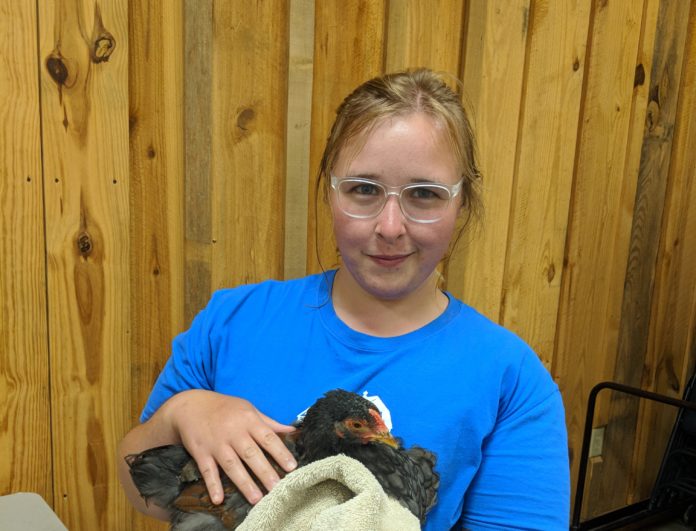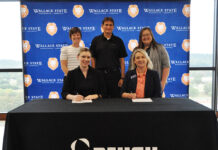
CULLMAN, Ala. – Not wanting to stay cooped up in their homes, chicken enthusiasts from around Cullman this week flocked to the North Alabama Agriplex for one of its Living Landscapes lectures, which focused on best practices for raising chickens, both casually and commercially.
Rachel Dawsey, Agriplex director, and Landon Marks, regional extension agent for the Alabama Cooperative Extension System, worked together to educate attendees on proper chicken selection, housing, nutrition, health care and culling practices.
Marks said for any chicken farmer, the two most important aspects of raising a healthy flock are proper nutrition and proper facilities.
When feeding chickens, it’s important to base their diets not only on what they’re being raised for, but also how old they are. For example, feeding a broiler (chicken raised for meat) diet to a layer (chicken raised for eggs) will result in poor eggshell quality due to the lack of calcium, and an immature chicken will not be able to handle the high calcium level in a fully-grown layer diet and may experience bone deformation or kidney failure.
Ensuring that chickens have a clean, dry, well-ventilated space to live will also help prevent pathogens from growing and spreading.
“It’s important that your facilities are easily accessible for you to get inside, easy to clean and easy to keep dry,” Marks said. “You’ve got to make sure your feeders and waterers are positioned correctly so that the chickens have access to them all the time. The coop should also have access to sunlight to keep pathogens from growing, maybe some windows or a fenced-in open area that faces southeast.”
Other practices that can help prevent diseases from spreading include quarantining new chickens for 30 days before introducing them to the coop (this gives any diseases time to incubate, show symptoms and possibly be treated without infecting the rest of the flock), immediately quarantining a chicken that shows signs of infection, thoroughly cleaning and bleaching any equipment bought used or second-hand and keeping a specific pair of boots just to walk around the coop and a small tub of a bleach-water mixture to disinfect those boots afterward. It’s also important to know a veterinarian who works with chickens (not all of them do) who can vaccinate the flock and examine fecal samples for parasites or protozoa.
The last point in the lecture was on hen culling, specifically on recognizing when a layer should be culled and when to wait. Some aspects of a layer’s appearance or attitude make it obvious that it should be culled – defects like blindness or a crossed beak, emaciated or underdeveloped bodies, aggression and egg-eating tendencies – but some appearances can be deceiving. Since laying requires so much energy and nutrients, thinner or less lustrous hens may be more productive than fatter or fluffier ones, so farmers may want to separate the layers for a little while to truly determine which ones are more productive. Layers with unusually long molts may also need to be culled, but Marks said not to confuse a regular molt with a permanent decline in productivity.
“Molting takes a huge amount of energy and nutrients, just like laying, so most chickens can’t do both at the same time. Usually these molts start in the fall, and you won’t be getting a lot of eggs from them until they’re done,” he said. “Don’t be those folks that say, ‘Well they’re not laying anymore so I’m not gonna feed them anymore.’ This is when they need those nutrients the most. And when they’re done molting, their production cycle starts all over again.”
After the lecture, Dawsey gave out door prizes including a carton of eggs fresh from her own coop, and visitors could stop by before leaving to pet some of the chickens she brought.
For those looking for references about farming, fishing, gardening, forestry, food safety and more, the Alabama Cooperative Extension System has numerous articles on its website (www.aces.edu/). The Agriplex also hosts several educational programs throughout the year, including another Living Landscapes lecture about fall crops and “salad bowl gardens” on Aug. 22 ($5 per person, registration can be found at https://cullmanrecreation.recdesk.com/Community/Program/Detail?programId=234).
Copyright 2019 Humble Roots, LLC. All Rights Reserved.



























